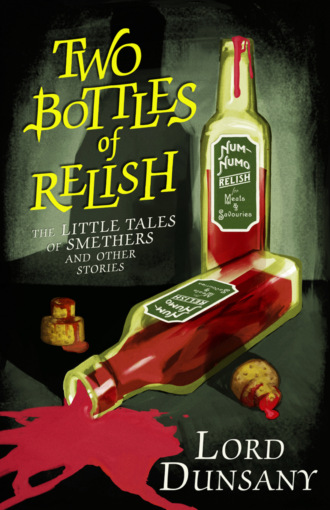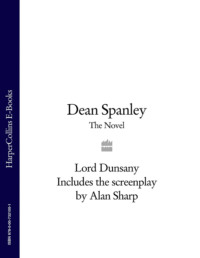
Полная версия
Two Bottles of Relish: The Little Tales of Smethers and Other Stories
‘And what did you find,’ I asked Slugger, ‘when you went in?’
‘Just a big file,’ he said, ‘and the knife and the axe that he must have got to chop her up with.’
‘But he got the axe to chop trees with,’ I said.
‘Well, yes,’ he said, but rather grudgingly.
‘And what did he chop them for?’ I asked.
‘Well of course, my superiors has theories about that,’ he said, ‘that they mightn’t tell to everybody.’
You see, it was those logs that were beating them.
‘But did he cut her up at all?’ I asked.
‘Well, he said that she was going to South America,’ he answered. Which was really very fair-minded of him.
I don’t remember now much else that he told me. Steeger left the plates and dishes all washed up and very neat, he said.
Well, I brought all this back to Linley, going up by the train that started just about sunset. I’d like to tell you about the late Spring evening, so calm over that grim bungalow, closing in with a glory all round it, as though it were blessing it; but you’ll want to hear of the murder. Well, I told Linley everything, though much of it didn’t seem to me to be worth the telling. The trouble was that the moment I began to leave anything out, he’d know it, and make me drag it in. ‘You can’t tell what may be vital,’ he’d say. ‘A tin-tack swept away by a housemaid might hang a man.’
All very well, but be consistent even if you are educated at Eton and Harrow, and whenever I mentioned Numnumo, which after all was the beginning of the whole story, because he wouldn’t have heard of it if it hadn’t been for me, and my noticing that Steeger had bought two bottles of it, why then he said that things like that were trivial and we should keep to the main issues. I naturally talked a bit about Numnumo, because only that day I had pushed close on fifty bottles of it in Unge. A murder certainly stimulates people’s minds, and Steeger’s two bottles gave me an opportunity that only a fool could have failed to make something of. But of course all that was nothing at all to Linley.
You can’t see a man’s thoughts and you can’t look into his mind, so that all the most exciting things in the world can never be told of. But what I think happened all that evening with Linley, while I talked to him before supper, and all through supper, and sitting smoking afterwards in front of our fire, was that his thoughts were stuck at a barrier there was no getting over. And the barrier wasn’t the difficulty of finding ways and means by which Steeger might have made away with the body, but the impossibility of finding why he chopped those masses of wood every day for a fortnight, and paid as I’d just found out, £25 to his landlord to be allowed to do it. That’s what was beating Linley. As for the ways by which Steeger might have hidden the body, it seemed to me that every way was blocked by the police. If you said he buried it they said the chalk was undisturbed, if you said he carried it away they said he never left the place, if you said he burned it they said no smell of burning was ever noticed when the smoke blew low, and when it didn’t they climbed trees after it. I’d taken to Linley wonderfully, and I didn’t have to be educated to see there was something big in a mind like his, and I thought that he could have done it. When I saw the police getting in before him like that, and no way that I could see of getting past them, I felt real sorry.
Did anyone come to the house? he asked me once or twice. Did anyone take anything away from it? But we couldn’t account for it that way. Then perhaps I made some suggestion that was no good, or perhaps I started talking of Numnumo again, and he interrupted me rather sharply.
‘But what would you do, Smethers?’ he said. ‘What would you do yourself?’
‘If I’d murdered poor Nancy Elth?’ I asked.
‘Yes,’ he said.
‘I can’t ever imagine doing of such a thing,’ I told him.
He sighed at that, as though it were something against me.
‘I suppose I should never be a detective,’ I said. And he just shook his head.
Then he looked broodingly into the fire for what seemed an hour. And then he shook his head again. We both went to bed after that.
I shall remember the next day all my life. I was out till evening, as usual, pushing Numnumo. And we sat down to supper about nine. You couldn’t get things cooked at those flats, so of course we had it cold. And Linley began with a salad. I can see it now, every bit of it. Well, I was still a bit full of what I’d done in Unge, pushing Numnumo. Only a fool, I know, would have been unable to push it there; but still, I had pushed it; and about fifty bottles, forty-eight to be exact, are something in a small village, whatever the circumstances. So I was talking about it a bit; and then all of a sudden I realized that Numnumo was nothing to Linley, and I pulled myself up with a jerk. It was really very kind of him; do you know what he did? He must have known at once why I stopped talking, and he just stretched out a hand and said: ‘Would you give me a little of your Numnumo for my salad?’
I was so touched I nearly gave it him. But of course you don’t take Numnumo with salad. Only for meats and savouries. That’s on the bottle.
So I just said to him, ‘Only for meats and savouries.’ Though I don’t know what savouries are. Never had any.
I never saw a man’s face go like that before.
He seemed still for a whole minute. And nothing speaking about him but that expression. Like a man that’s seen a ghost, one is tempted to write. But it wasn’t really at all. I’ll tell you what he looked like. Like a man that’s seen something that no one has ever looked at before, something he thought couldn’t be.
And then he said in a voice that was all quite changed, more low and gentle and quiet it seemed, ‘No good for vegetables, eh?’
‘Not a bit,’ I said.
And at that he gave a kind of sob in his throat. I hadn’t thought he could feel things like that. Of course I didn’t know what it was all about; but, whatever it was, I thought all that sort of thing would have been knocked out of him at Eton and Harrow, an educated man like that. There were no tears in his eyes but he was feeling something horribly.
And then he began to speak with big spaces between his words, saying, ‘A man might make a mistake perhaps, and use Numnumo with vegetables.’
‘Not twice,’ I said. What else could I say?
And he repeated that after me as though I had told of the end of the world, and adding an awful emphasis to my words, till they seemed all clammy with some frightful significance, and shaking his head as he said it.
Then he was quite silent.
‘What is it?’ I asked.
‘Smethers,’ he said.
‘Yes,’ I said.
‘Smethers,’ said he.
And I said, ‘Well?’
‘Look here, Smethers,’ he said, ‘you must ’phone down to the grocer at Unge and find out from him this.’
‘Yes?’ I said.
‘Whether Steeger bought those two bottles, as I expect he did, on the same day, and not a few days apart. He couldn’t have done that.’
I waited to see if any more was coming, and then I ran out and did what I was told. It took me some time, being after nine o’clock, and only then with the help of the police. About six days apart they said; and so I came back and told Linley. He looked up at me so hopefully when I came in, but I saw that it was the wrong answer by his eyes.
You can’t take things to heart like that without being ill, and when he didn’t speak I said: ‘What you want is a good brandy, and go to bed early.’
And he said: ‘No. I must see someone from Scotland Yard. ’Phone round to them. Say here at once.’
‘But,’ I said, ‘I can’t get an inspector from Scotland Yard to call on us at this hour.’
His eyes were all lit up. He was all there all right.
‘Then tell them,’ he said, ‘they’ll never find Nancy Elth. Tell one of them to come here and I’ll tell him why.’ And he added, I think only for me, ‘They must watch Steeger, till one day they get him over something else.’
And, do you know, he came. Inspector Ulton; he came himself.
While we were waiting I tried to talk to Linley. Partly curiosity, I admit. But I didn’t want to leave him to those thoughts of his, brooding away by the fire. I tried to ask him what it was all about. But he wouldn’t tell me. ‘Murder is horrible’ is all he would say. ‘And as a man covers his tracks up it only gets worse.’
He wouldn’t tell me. ‘There are tales,’ he said, ‘that one never wants to hear.’
That’s true enough. I wish I’d never heard this one. I never did actually. But I guessed it from Linley’s last words to Inspector Ulton, the only ones that I overheard. And perhaps this is the point at which to stop reading my story, so that you don’t guess it too; even if you think you want murder stories. For don’t you rather want a murder story with a bit of a romantic twist, and not a story about real foul murder? Well, just as you like.
In came Inspector Ulton, and Linley shook hands in silence, and pointed the way to his bedroom; and they went in there and talked in low voices, and I never heard a word.
A fairly hearty-looking man was the inspector when they went into that room.
They walked through our sitting-room in silence when they came out, and together they went into the hall, and there I heard the only words they said to each other. It was the inspector that first broke that silence.
‘But why,’ he said, ‘did he cut down the trees?’
‘Solely,’ said Linley, ‘in order to get an appetite.’
Конец ознакомительного фрагмента.
Текст предоставлен ООО «ЛитРес».
Прочитайте эту книгу целиком, купив полную легальную версию на ЛитРес.
Безопасно оплатить книгу можно банковской картой Visa, MasterCard, Maestro, со счета мобильного телефона, с платежного терминала, в салоне МТС или Связной, через PayPal, WebMoney, Яндекс.Деньги, QIWI Кошелек, бонусными картами или другим удобным Вам способом.



